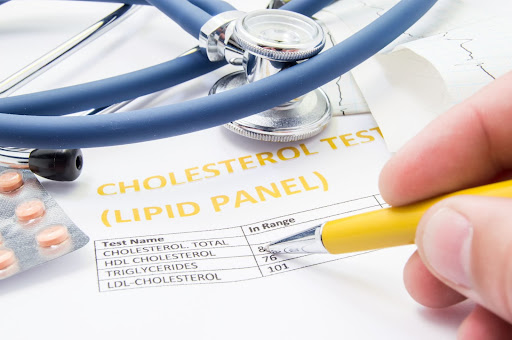Blog
What is high cholesterol?

Despite often being associated with overweight men above a certain age, high cholesterol levels can be caused by a range of different things, from lifestyle choices to genetics, meaning anyone can suffer from high cholesterol, regardless of age, gender, diet, and activity level.
Unfortunately, high cholesterol is common and in many cases, it doesn’t cause any obvious symptoms.
With this in mind, it’s important that everyone is aware of exactly what high cholesterol is and understands what warning signs they should be looking out for and what cholesterol medications are available to help lower your levels if required.
What does high cholesterol mean?
In simple terms, high cholesterol means that there is too much cholesterol in your blood’s composition. This is dangerous as too much cholesterol can lead to a buildup in your arteries (the vital blood vessels that allow blood to be carried around your body).
Over time, these buildups of cholesterol can form blockages that can start to clog up your arteries, slowing and even preventing the flow of blood. If left untreated, it is these blockages that can then cause potentially fatal heart attacks and strokes.
What are the warning signs of high cholesterol?
As already touched upon, high cholesterol doesn’t usually display any symptoms until it causes an emergency event, such as a heart attack or stroke.
For this reason, the only way to know if you have high cholesterol for sure is to visit your GP and take a blood test. However, while there are no obvious warning signs of high cholesterol, there are a number of symptoms linked with strokes and heart attacks you should keep an eye out for. These include:
* Chest pain / angina
* Nausea and vomiting
* High blood pressure
* Shortness of breath
* Feelings of numbness or tingling in your arms and/or legs
* Extreme tiredness / fatigue
* Slurred speech
If you are experiencing any of these symptoms, seek urgent medical attention.
Why does cholesterol build up in arteries?
When you have excess cholesterol in your blood, it can start to build up around the walls of your arteries, forming fatty deposits known as plaque. These deposits can harden over time, making arteries stiffer and restricting the flow of blood. This process is known as atherosclerosis.
What happens if your arteries become blocked?
When a buildup of cholesterol causes deposits of plaque to form in your arteries, these blood vessels can become blocked. If this happens, the reduced blood flow can lead to chest pain (also known as angina), shortness of breath, and other signs of coronary heart disease. If a partial blockage is left untreated and becomes a complete blockage, it can lead to a heart attack, stroke or death.
High cholesterol medication
Although in some cases cholesterol levels can be lowered naturally through lifestyle changes involving a better diet and more exercise, your doctor may also recommend specialist medication that can help lower cholesterol. These drugs include:
- Statins
These drugs help to reduce the amount of cholesterol produced by the liver, and include atorvastatin and simvastatin.
- Cholesterol absorption inhibitors
These medications work to reduce the number of triglycerides in your blood, which in turn decreases the amount of cholesterol your body absorbs from the foods you eat.
- Bile acid sequestrants
These drugs are designed to reduce the amount of fat your body absorbs from the food you eat, subsequently reducing the amount of cholesterol your body stores. These medications include cholestyramine, colestipol, and colesevelam.
How high does my cholesterol have to be for medication?
As a rule, medication is only usually recommended for high cholesterol when:
* Cholesterol levels are deemed high enough to pose a significantly increased / immediate risk of cardiovascular disease, or if you have already experienced a cardiovascular event (such as a stroke or heart attack) in the past.
* You also suffer from diabetes (those with diabetes are between two and four times more likely to develop a cardiovascular disease).
* You have a low-density lipoprotein (LDL) level of 90 milligrams per deciliter (mg/dL) or higher, and/or a triglyceride level of 885 mg/dL or higher.
Your GP will be able to test your blood and advise whether you would benefit from cholesterol medication based on the criteria outlined above.
Here at Access Doctor, we offer a range of prescription cholesterol-lowering medications which you may be able to obtain following a consultation with one of our in-house doctors.
If your chosen medication is considered a suitable treatment for your health condition, we will send your purchase directly to your home, confidentially and discreetly.
